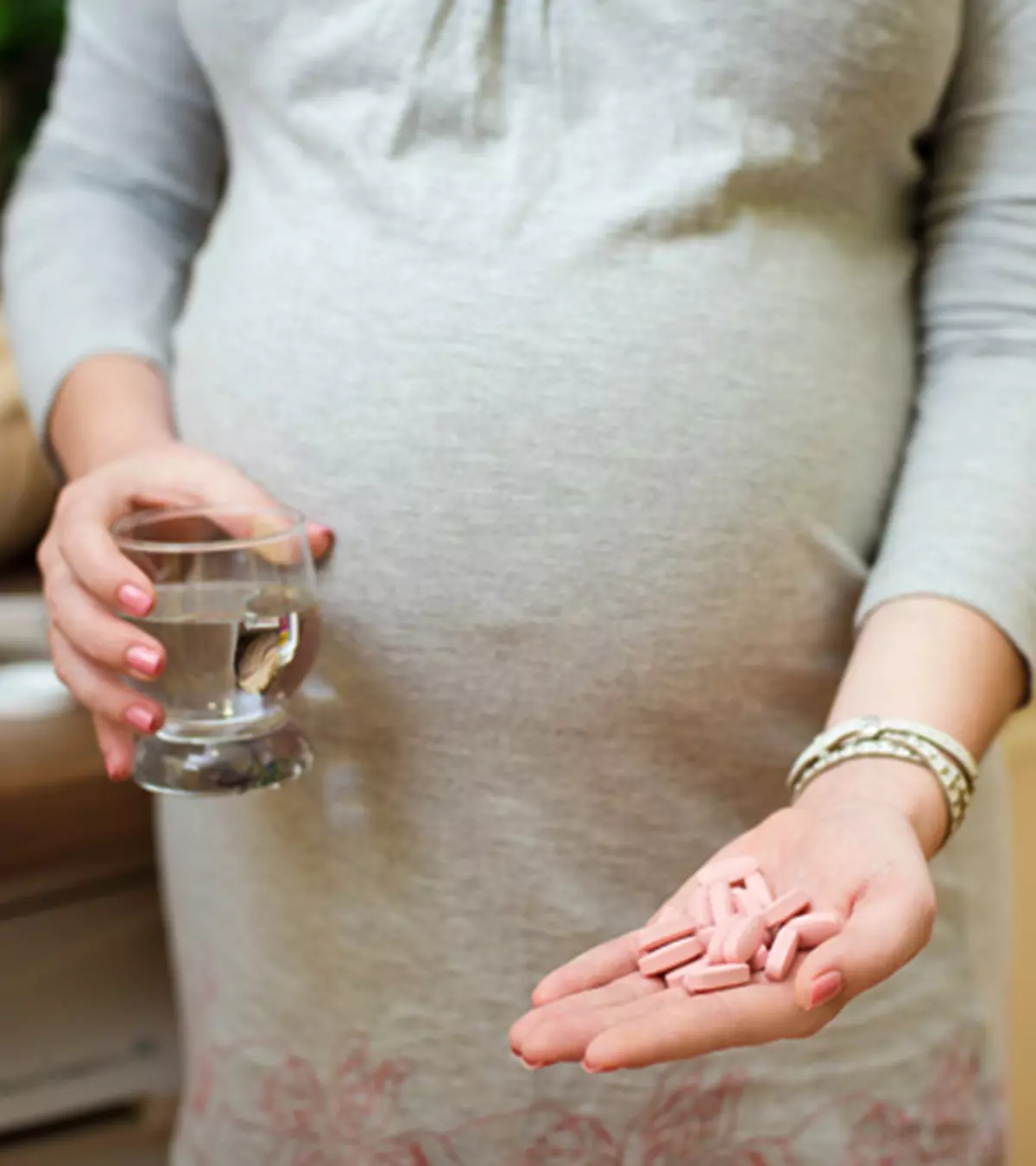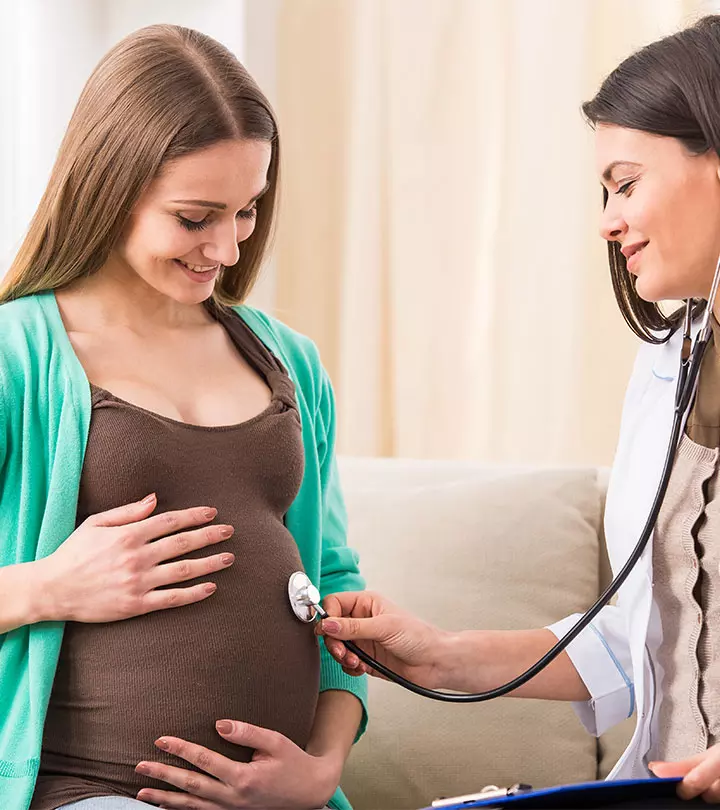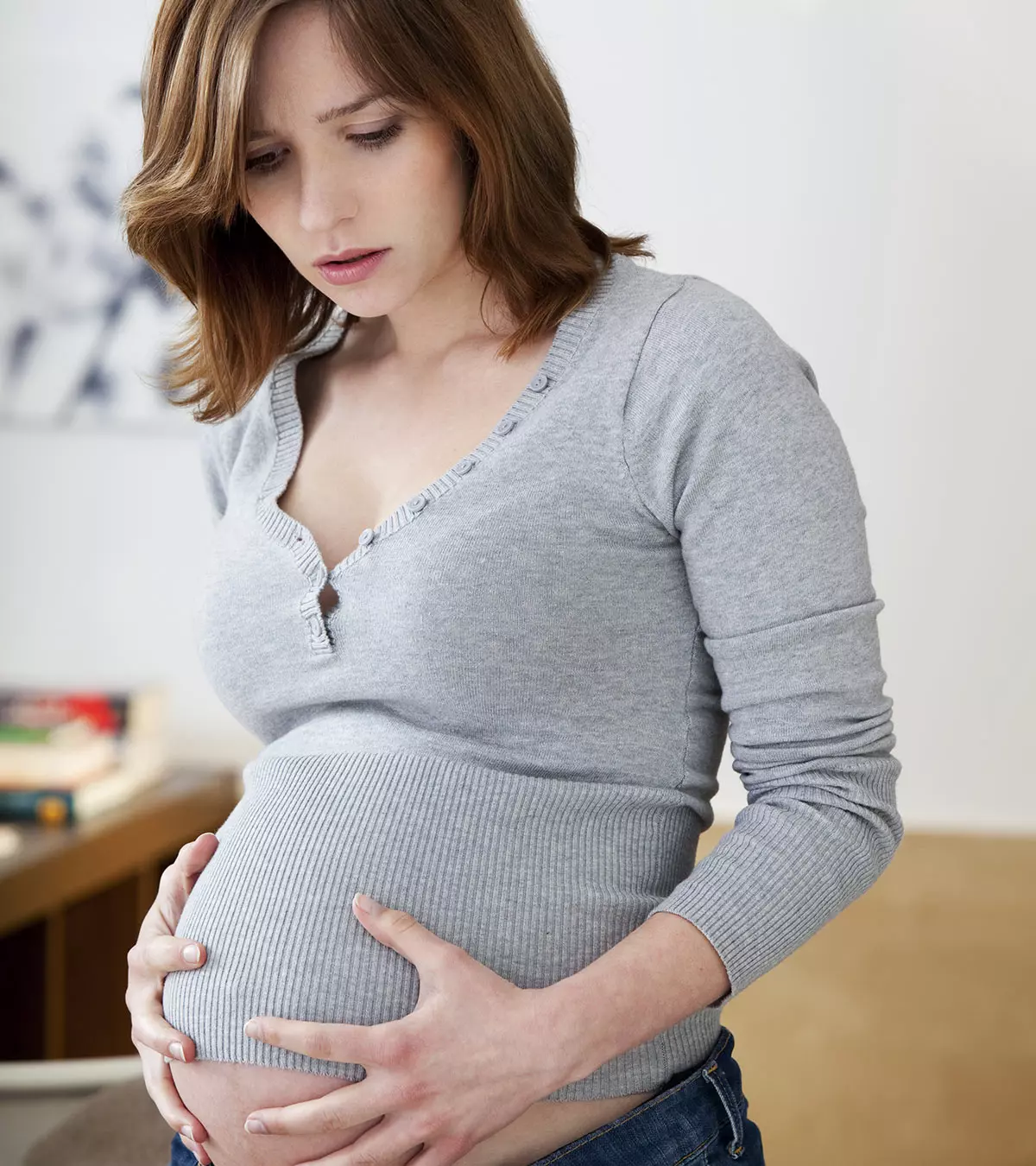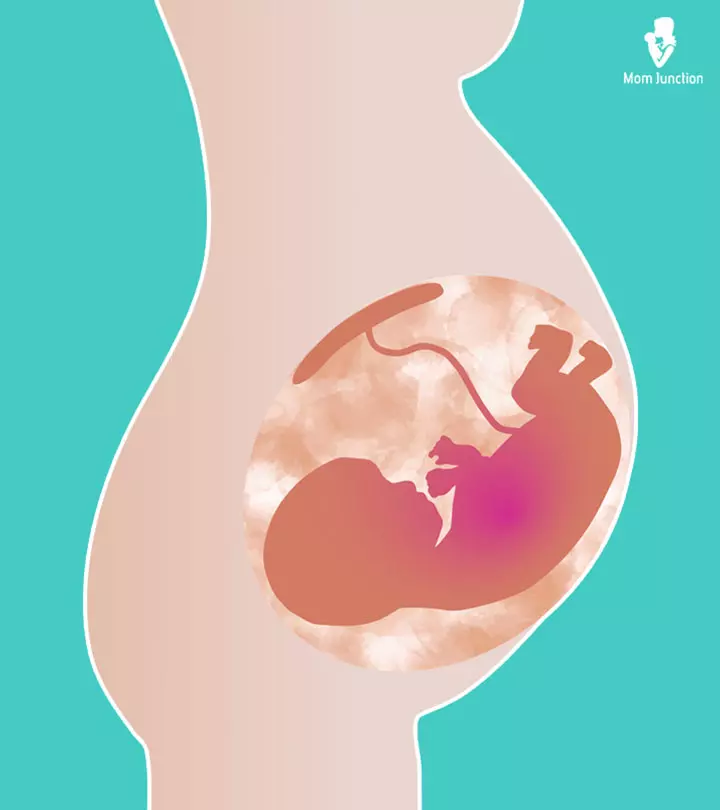
Image: ShutterStock
Women are susceptible to being affected by malaria during pregnancy which, if not treated immediately, might cause complications for both the mother and the baby (1). However, with the help of proper treatment and timely medical intervention, the symptoms and complications can be avoided. You cannot just have any medicine to cure the symptoms of malaria as it involves the risk of harming the fetus. The risks of not getting proper medical intervention may include infant mortality, maternal anemia, preterm birth, or infant low birth weight. Read on to know more about the causes, signs, diagnosis, treatment, prevention, and possible risk factors of contracting malaria when pregnant.
Key Pointers
- Pregnant women from tropical and developing countries are more susceptible to malaria.
- Lowered immunity, living in unstable areas, HIV infections, and the presence of the placenta increase the risk of infection during pregnancy.
- Symptoms of malaria in pregnancy include high fever, nausea, headache, vomiting, and jaundice.
- Severe malaria may cause life-threatening diseases such as anemia, acute pulmonary edema, hypoglycemia, renal failure, and immunosuppression in pregnant women.
- When left untreated, it can also affect fetal health and lead to premature birth, low birth weight, and pregnancy loss.
- Adequate prevention measures, timely diagnosis, and treatment can avoid adverse outcomes.
Malaria Infection During Pregnancy

Malaria is an infectious disease caused due to the plasmodium parasite transmitted by the bite of the female Anopheles mosquito. Studies show that pregnant women are more prone to malarial infection than non-pregnant women in tropical and developing countries (2).
There are four kinds of malaria parasites namely, plasmodium falciparum, plasmodium vivax, plasmodium ovale, plasmodium malariae. Among these, plasmodium falciparum causes severe illness (3) by entering the bloodstream. It further enters the liver, multiplies and goes back to infect the red blood cells (4).
Causes Of Malaria In Pregnancy
As mentioned above, malaria is a mosquito-borne disease predominant in tropical regions. Usually, this parasitic infection erupts during the monsoon season as it provides the ground for mosquito breeding. Factors like humidity, temperature, and rainfall play a significant role in the occurrence of malaria (5).
The other possible reasons are (6):
- Loss of immunity: Pregnancy weakens a woman’s immune system in general due to decreased immunoglobuliniAntibodies or the proteins produced by the immune system to fight infections synthesis. This makes the expectant woman vulnerable to malaria.
- The new organ placenta: Placenta is a new organ growing inside your body. It allows the infection to pass through the immunity circle, and also allows placenta-specific phenotypes to multiply.
- Transmission areas: Women in stable/ high transmission areas must have acquired immunity against malaria. Hence their chances of getting the infection are fewer. But in unstable/low transmission areas, women have lower immunity levels, which increases the risk of the infection.
- HIV infection: Women infected with HIV have a high risk of contracting malaria due to their poor immunity level.
If you live in a region with a generally high prevalence of malaria, then you need to be alert in detecting the symptoms of malaria early.
Signs And Symptoms Of Malaria In Pregnancy
In its early stage, the symptoms of malaria can be similar to those of influenza or viral infection. Only a blood test can help determine the exact infection. The common symptoms of malaria in pregnancy are (7):
- High fever and sweating or feeling chills
- Nausea
- Cough
- Headache
- Vomiting
- Muscle pain
- Diarrhea
- Jaundice
- Respiratory distress
- Splenomegaly (enlargement of the spleen)
- Pallor (pale appearance)
- General malaise
It is important to recognize and treat pregnancy malaria at the earliest because it can bring along other health complications both for the mother and the baby.
Complications Of Malaria In Pregnancy
Malaria is classified into uncomplicated and severe infection. The uncomplicated malaria infection is associated with the symptoms like a headache, fever, shivering, and sweating that occur every two to three days and last for six to ten hours.
Severe malaria is a life-threatening infection that can lead to anemia, acute respiratory distress syndrome, cerebral malariaiThe most severe neurological complications arising from a malarial infection , and organ damages. Here are some of the complications in expecting mothers:
- Anemia: Once the plasmodium falciparum parasite infects the blood, it results in hemolysis (rupture of red blood cells), creating increased demand for blood supply. This leads to anemia, which might, in turn, lead to postpartum hemorrhage and maternal and neonatal mortality.
- Acute pulmonary edema is a severe form of anemia that could occur during the second or third trimester. It is a severe medical condition caused due to P. falciparum infection, which leads to the formation of a hyaline membrane in the alveoliiAir sacs at the end of the bronchioles causing leakage of fluids into the lungs (8).
- Immunosuppression: Hormonal changes during pregnancy impact your immune system. Your body continuously secretes the immunosuppressive hormone called cortisol, which lowers the immunity. As the cortisol level increases in expectant women, the resistance to malaria parasite decreases (9). This may lead to complications such as hyperpyrexiaiA fever of 106.7°F (41.5°C) or above caused due to changes in the hypothalamus , hypoglycemia, severe hemolyticiA type of anemia in which the rate of destruction of red blood cells is higher than the production rate anemia, and pulmonary edema (6).
- Hypoglycemia: It is a medical condition where the blood sugar level falls below 60mg/dl. It is caused due to an increased hypercatabolic action of infectious falciparum parasites. This leads to increased use of glucose and weakened production of glucose due to the inhibition of gluconeogenesisiA metabolic process by which the organisms produce sugars by the parasitic actions (10). This condition remains asymptomatic. Therefore, pregnant women, who are at risk, need to be constantly monitored for hypoglycemia.
- Renal failure: It is another adverse effect of malarial infection in pregnant women. Parasitemia and undetected dehydration of the body during malaria leads to renal dysfunction. The treatment includes the patient being put on diureticsiMedications that enable the kidneys to produce more urine and get rid of the excess fluid from the body and fluid management. DialysisiMedical procedure that helps get rid of waste products and excess fluids for patients with under-functioning kidneys is advised, if needed.
The severe form of malaria affects not only the mother but also the baby in her womb.
Complications in babies
Here are some complications that the fetus could face when its mother has malaria:
- Low birth weight or IUGR: Placenta provides the ground for malarial parasites to attach and prevent the supply of oxygen and nutrients to the fetus (10). This could result in low birth weight infants and intrauterine growth retardation. Infants born with a weight less than 5.5 pounds (2.5kg) have fewer chances of survival (11).
- Vertical transmission: Another obvious risk is the infection being spread from the mother to the baby. If the mother gets timely attention and medication, then the unborn babies may remain unaffected. However, doctors advise blood screening of the newborn after birth to rule out any infection.
- Preterm delivery: As per the US Centers for Disease Control and Prevention (US CDC) reports, in 2021, around one out of every ten infants in the US were born preterm (12). Various factors can contribute to preterm birth, including malarial infection caused by P. falciparum. When P. falciparum infects the maternal placenta, the parasites multiply. The malaria-infected placenta carries cytokines, antibodies, and macrophages that trigger an active immune response, thereby stimulating early labor.
- Miscarriages: In a study published in the journal Lancet Infectious Diseases, researchers write that one in two pregnant women infected with symptomatic malaria have miscarriages, while one in three women have the risk of a miscarriage if the malaria is asymptomatic. Dr Rose McGready from the Shoklo Malaria Research Unit, who was a part of the research, says, “Our work has highlighted the particular risk factors with malaria infection during pregnancy. Particularly worrying is the risk of miscarriage even when the disease is asymptomatic. However, while the dangers of miscarriage are considerable, our study offers some good news: that the most common drugs reduce this risk significantly.”
Malaria during pregnancy presents potential risks to the lives of both the mother and the unborn baby. If you suspect malaria during pregnancy, go to the nearest healthcare facility or emergency room for proper diagnosis through a blood test. Do not attempt self-treatment, as certain antimalarial drugs can be harmful during pregnancy, and a healthcare provider needs to prescribe appropriate medication based on factors like the stage of pregnancy and severity of infection.
Diagnosis Of Malaria During Pregnancy
Pregnancy malaria is difficult to recognize and diagnose as the women are usually asymptomatic. Also, as the P. falciparum parasite sequesters in the placenta, the peripheral blood samples may not detect the infection.
To diagnose this problem, doctors usually collect blood samples from the placenta. You could be put through one or more of the below tests:
- Blood smear test: A drop of blood is taken and spread out on a microscopic slide. The sample is then examined for the parasite. It is a widely accepted standard test for diagnosis of malaria in pregnancy.
- Rapid diagnostic test (RDT): It detects the malaria antigens in the patient’s blood. However, the RDT is followed up with the microscopic diagnosis to confirm the result and determine the number of red blood cells infected. RDTs are generally used in those clinical settings where microscopy is not available.
- Detection of hemozoin: The presence of hemoglobin in the parasites result in the production of polymerized heme called hemozoin. It is detected by laser desorption mass spectrometry (LDMS) or a polarized light. The LDMS helps in identifying parasites in the range of 100–1000/μl blood, whereas polarized light captures the fluorescent properties of hemozoin (13).
- Polymerase chain reaction: PCR is a recent diagnostic tool, which is used for molecular diagnosis of malaria. It is considered better than microscopy and RDT as it can detect the presence of fewer parasites, even as few as 1-5 parasites/µl of blood (14).
- Histological examination: This method is considered to be more accurate than the others in detecting pregnancy malaria (15). Histology involves the examination of tissue samples under a microscope.
Treatment of malaria is possible through some pregnancy-safe medicines.
Treatment Of Malaria In Pregnancy
Pregnancy malaria needs immediate medical attention. The treatments include the use of antimalarial drugs that are safe in pregnancy. The current treatments for malaria in pregnancy are:
Treatment for uncomplicated malaria in pregnancy
First trimester: WHO recommends a combination of quinine and clindamycin in the case of uncomplicated pregnancy malaria detected during the first trimester.
Second and third trimester: As per WHO guidelines, artemisinin combination therapy (ACT) is the most effective and safe treatment during the second and third trimesters of pregnancy. ACT-AL (Artemether Lumefantrine) and ACT-SP (Sulfadoxine Pyrimethamine) are the recommended ACT for treatment of uncomplicated malaria (16).
Treatment for severe malaria in pregnancy
- The most recommended treatment is using intravenous (IV) artesunate or quinine. Towards the third trimester, artesunate suits the best because quinine poses the risk of hypoglycemia.
- Paracetamol tablets are recommended to subside high fever. Its effect lasts for four to six hours after which the patient might feel feverish again. This medicine is safe to administer during pregnancy and can be taken three to four times a day.
- While getting treated, you need to take care not to get dehydrated or over hydrated. Also, take adequate calories to overcome weakness.
 Quick fact
Quick factMalaria is caused due to mosquitoes, and it is easier to prevent the disease than get treated during pregnancy.
Prevention Of Malaria In Pregnancy
Follow these preventive measures to minimize the likelihood of getting infected:
- Insecticide-treated bed nets (ITN) help in repelling malaria causing mosquitoes. They are cost-effective and are a safe way to prevent malaria, thereby protecting both the expectant mother and her baby.
- Intermittent presumptive treatment (IPT) is a full therapeutic course of antimalarial medicine that reduces the chances of maternal malaria episodes, maternal and fetal anemia, placental parasitemiaiThe quantitative measure of parasites in the blood to gauge the severity of infection , low birth weight, and neonatal mortality. WHO recommends IPTp with sulfadoxine-pyrimethamine (IPTp-SP) in regions that have moderate to high risk of malaria (18).
- Wearing light colored clothes: Generally, mosquitoes are attracted to dark colors. Pregnant women, who live or travel to malaria-prone areas, should wear light-colored and full length garments with long sleeves to avoid exposure of skin.
- Stay in cool areas: Stay in cool or air conditioned areas since mosquitoes cannot flourish in cold temperatures.
 Quick tip
Quick tip Pregnant women have weak immunity, which makes them susceptible to infectious diseases. If you are pregnant and have any signs of a recurrent fever, then visit a doctor. A blood test can help determine the cause of a fever during pregnancy. Timely medical intervention and proper nursing at home can bring you back to sound maternal health.
 Point to consider
Point to considerFrequently Asked Questions
1. What are the other medicines that can be taken along with malaria medicines during pregnancy?
AntipyreticsiMedicines that help reduce fever like paracetamol (standard dose) can be given in the case of fever from malaria. Usual doses of folic acid and ferrous sulfate can also be taken.
2. How does pregnancy affect the efficacy of malaria treatments?
The efficacy of the treatment is lower in pregnant women than in non-pregnant women. However, regular follow-ups with the doctor and blood tests can aid in early treatments. These also reduce the chances of recurrence.
3. How are recurrences treated during pregnancy?
Recurrence of malaria in pregnancy is usually rare. However, in the case of recurrences, doctors recommend a seven-day treatment with artemisinin derivatives.
4. Can I get malaria if I have had it before?
Even if you are infected with malaria earlier, the chances of getting it again cannot be ruled out. Lowered immunity levels make you vulnerable during pregnancy. So, it is necessary to take preventive measures to avoid any malarial infection.
5. Is it safe to take antimalarial drugs during pregnancy?
Anti malarial drugs in pregnancy are safe but should be taken under the supervision of your doctor. You must strictly follow the medication course and take the doses as prescribed by the doctor.
6. Is there a connection between malaria and pregnancy?
According to research, pregnant women are more at risk of malaria infection than non-pregnant adults because of lowered immunity. Physiological and behavioral changes during pregnancy are seen as responsible factors for pregnant women to contract this disease. Malaria in pregnancy can lead to placental malaria, which causes placental inflammation, thus harming both mother and infant (21) (22).
7. Can I take antimalarial medicines when trying to conceive?
It is better to inform the doctor about taking antimalarial medicines when trying to conceive because it impacts your health. Not many studies have been done on the safety and efficacy of antimalarial treatments in pregnancy. Drugs such as halofantrine, doxycycline, and primaquine are known to harm the baby (17) (23).
Malaria during pregnancy can be uncomplicated or severe. In either case, this mosquito-borne disease needs prompt medical intervention. Delaying treatment could cause obstetric complications such as anemia, acute pulmonary edema, and hypoglycemia in infected mothers. On the other hand, it could cause growth failure and preterm delivery in babies. The treatment involves the use of pregnancy-safe anti-malarial antipyretic drugs. In addition, using insecticide-treated bed nets, wearing light-colored clothes, and staying in cool or air-conditioned areas are some ways expectant mothers and their babies can stay safe from malaria.
Infographic: Tips On Preventing Malaria In Pregnancy
Malaria is a serious disease and can be more complicated if you contract the infection when pregnant. Also, the treatments for non-pregnant individuals may not be advisable for expecting mothers. So, learn how to avoid the risk of malaria during pregnancy by scrolling through the infographic below. Illustration: Momjunction Design Team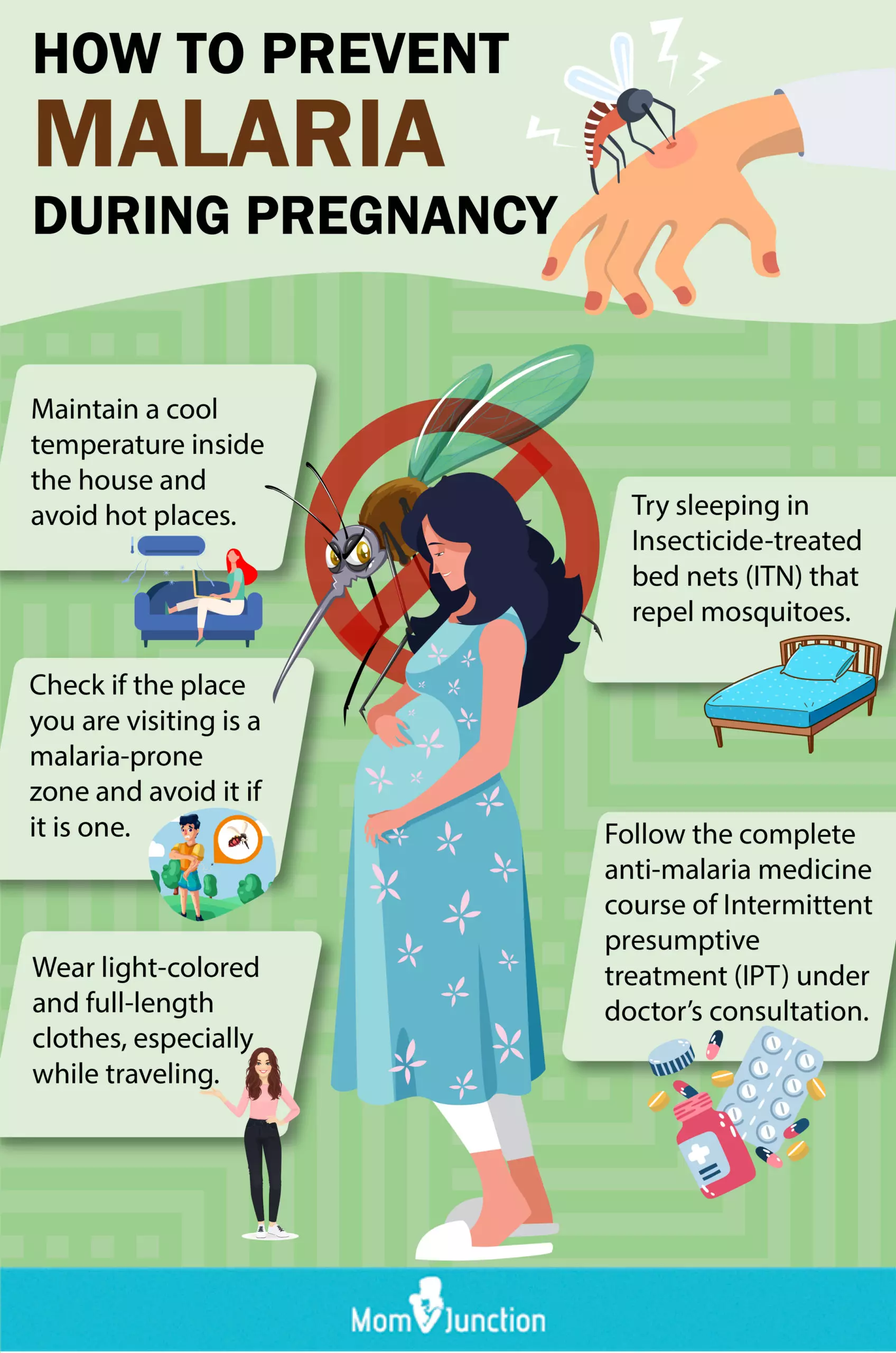
Illustration: Malaria During Pregnancy: Symptoms Treatment & Prevention
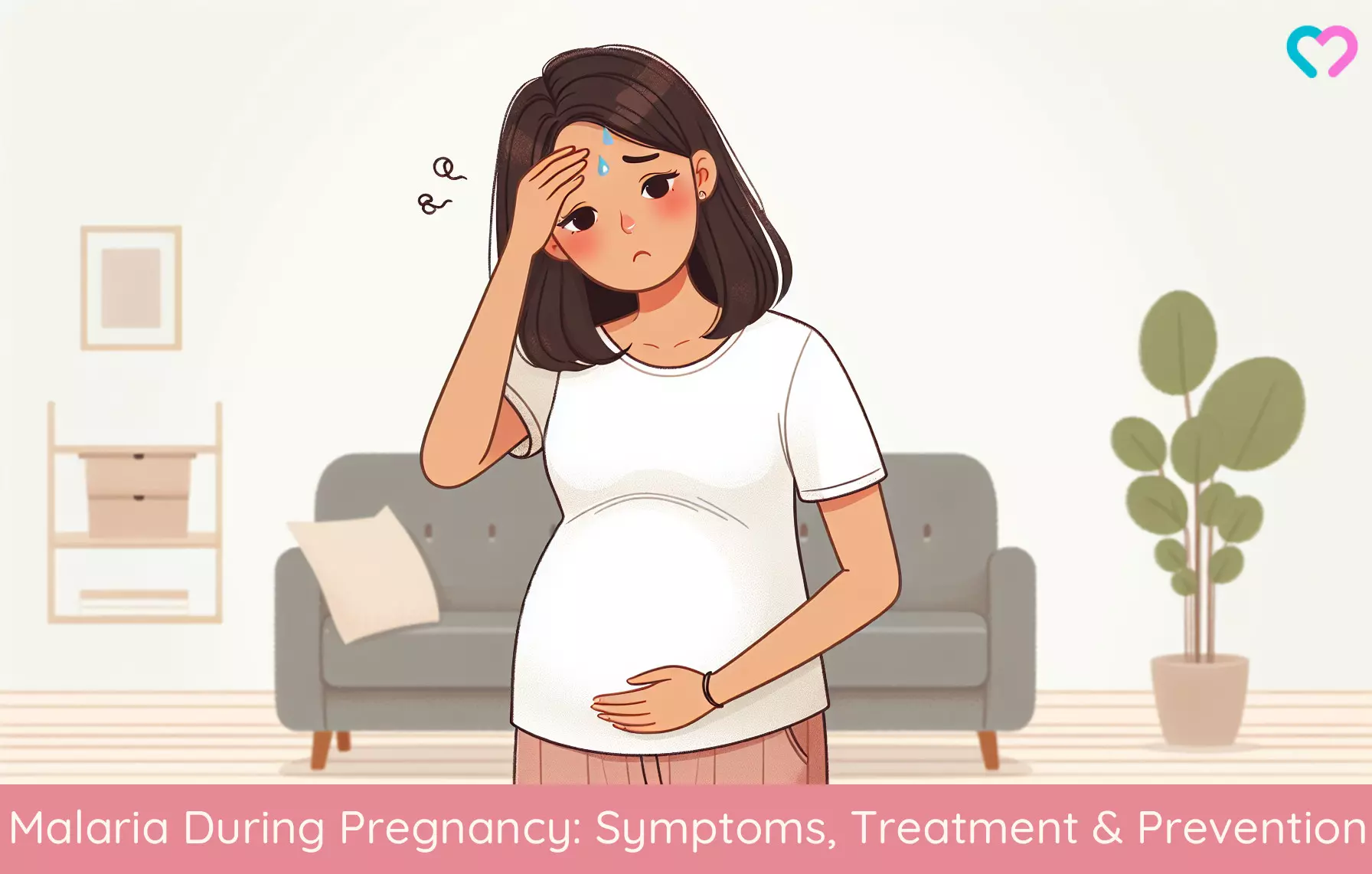
Image: Dall·E/MomJunction Design Team
References
- P Soma-Pillay and A P Macdonald; (2012); Malaria in pregnancy.
https://www.ncbi.nlm.nih.gov/pmc/articles/PMC4989681/ - Samuel C. K. Tay et al.; (2013); Malaria and Anaemia in Pregnant and Non-Pregnant Women of Child-Bearing Age at the University Hospital Kumasi Ghana.
https://file.scirp.org/pdf/OJMM_2013091815574461.pdf - Chapter 83 Malaria.
https://www.ncbi.nlm.nih.gov/books/NBK8584/ - Malaria during pregnancy: New study assesses risks during first trimester
https://www.sciencedaily.com/releases/2011/12/111212220956.htm - Julianna Schantz-Dunn and Nawal M Nour; (2009); Malaria and Pregnancy: A Global Health Perspective.
https://www.ncbi.nlm.nih.gov/pmc/articles/PMC2760896/ - Malaria and Pregnancy
https://www.malariasite.com/pregnancy/ - Malaria
https://my.clevelandclinic.org/health/diseases/15014-malaria - Pulmonary edema.
https://medlineplus.gov/ency/article/000140.htm - Marielle K Bouyou-Akotet et al.; (2005); Cortisol and susceptibility to malaria during pregnancy.
https://pubmed.ncbi.nlm.nih.gov/16002311/ - Huynh V Thien, Piet A Kager, Hans P Sauerwein; (2022); Hypoglycemia in falciparum malaria: is fasting an unrecognized and insufficiently emphasized risk factor?
https://pubmed.ncbi.nlm.nih.gov/16839817/ - Helen L. Guyatt and Robert W. Snow; (2004); Impact of Malaria during Pregnancy on Low Birth Weight in Sub-Saharan Africa.
https://journals.asm.org/doi/full/10.1128/cmr.17.4.760-769.2004 - Preterm Birth.
https://www.cdc.gov/maternal-infant-health/preterm-birth/ - Michal Fried et al.; (2012); Diagnosing malaria in pregnancy: an update.
https://www.ncbi.nlm.nih.gov/pmc/articles/PMC3552641/ - Noppadon Tangpukdee et al.; (2009); Malaria Diagnosis: A Brief Review.
https://www.ncbi.nlm.nih.gov/pmc/articles/PMC2688806/ - Malaria Diagnostic Tests.
https://www.cdc.gov/malaria/hcp/diagnosis-testing/malaria-diagnostic-tests.html - Diagnosis and Treatment of Malaria.
https://nvbdcp.gov.in/Doc/Diagnosis-Treatment-Malaria-2013.pdf - François Nosten et al.; (2006); Antimalarial drugs in pregnancy: a review.
https://pubmed.ncbi.nlm.nih.gov/18690910/# - WHO policy brief for the implementation of intermittent preventive treatment of malaria in pregnancy using sulfadoxine-pyrimethamine (IPTp-SP).
https://www.afro.who.int/sites/default/files/2017-06/iptp-sp-updated-policy-brief-24jan2014.pdf - Preventing Mosquito Bites
https://www.cdc.gov/mosquitoes/prevention/index.html - Malaria and pregnancy patient information leaflet.
https://www.rcog.org.uk/for-the-public/browse-our-patient-information/malaria-and-pregnancy/ - Malaria in Pregnancy: Linking Immunity and Pathogenesis to Prevention.
https://www.ncbi.nlm.nih.gov/books/NBK1710/ - Malaria in Pregnancy: From Placental Infection to Its Abnormal Development and Damage.
https://www.frontiersin.org/journals/microbiology/articles/10.3389/fmicb.2021.777343/full - Malaria.
https://www.medicinesinpregnancy.org/leaflets-a-z/malaria/
Community Experiences
Join the conversation and become a part of our nurturing community! Share your stories, experiences, and insights to connect with fellow parents.
Read full bio of Dr. Shalini MA
Read full bio of Sakshi Mishra
Read full bio of Rebecca Malachi
Read full bio of Dr. Joyani Das














